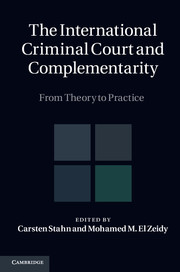Book contents
- Frontmatter
- Contents
- Acknowledgments
- Foreword by HE Judge Sang-Hyun Song
- Foreword by Patricia O’Brien
- Foreword by Silvia A. Fernandez de Gurmendi
- List of abbreviations
- Introduction: bridge over troubled waters?
- PART I General reflections
- PART II Origin and genesis of complementarity
- PART III Analytical dimensions of complementarity
- PART IV Interpretation and application
- PART IV (Continued) Interpretation and application
- PART V Complementarity in perspective
- PART VI Complementarity in practice
- 31 Making complementarity work: maximizing the limited role of the Prosecutor
- 32 Positive complementarity in action
- 33 Complementarity and the construction of national ability
- 34 The Colombian peace process (Law 975 of 2005) and the ICC’s principle of complementarity
- 35 Darfur: complementarity as the drafters intended?
- 36 Complementarity in Uganda: domestic diversity or international imposition?
- 37 Courts, conflict and complementarity in Uganda
- 38 Chasing cases: the ICC and the politics of state referral in the Democratic Republic of the Congo and Uganda
- 39 A problem, not a solution: complementarity in the Central African Republic and Democratic Republic of the Congo
- 40 Complementarity and the impact of the Rome Statute and the International Criminal Court in Kenya
- Index
- References
31 - Making complementarity work: maximizing the limited role of the Prosecutor
from PART VI - Complementarity in practice
Published online by Cambridge University Press: 05 November 2014
- Frontmatter
- Contents
- Acknowledgments
- Foreword by HE Judge Sang-Hyun Song
- Foreword by Patricia O’Brien
- Foreword by Silvia A. Fernandez de Gurmendi
- List of abbreviations
- Introduction: bridge over troubled waters?
- PART I General reflections
- PART II Origin and genesis of complementarity
- PART III Analytical dimensions of complementarity
- PART IV Interpretation and application
- PART IV (Continued) Interpretation and application
- PART V Complementarity in perspective
- PART VI Complementarity in practice
- 31 Making complementarity work: maximizing the limited role of the Prosecutor
- 32 Positive complementarity in action
- 33 Complementarity and the construction of national ability
- 34 The Colombian peace process (Law 975 of 2005) and the ICC’s principle of complementarity
- 35 Darfur: complementarity as the drafters intended?
- 36 Complementarity in Uganda: domestic diversity or international imposition?
- 37 Courts, conflict and complementarity in Uganda
- 38 Chasing cases: the ICC and the politics of state referral in the Democratic Republic of the Congo and Uganda
- 39 A problem, not a solution: complementarity in the Central African Republic and Democratic Republic of the Congo
- 40 Complementarity and the impact of the Rome Statute and the International Criminal Court in Kenya
- Index
- References
Summary
While it is too early to make any definitive judgment, the impact of the International Criminal Court so far on national prosecutions has been minimal. Not all of this can be blamed on the Court, but a number of opportunities have been missed and it is time to reassess how the issue of complementarity is dealt with in practice.
There are four basic problems that have severely limited the court's impact on national proceedings. One is the lack of clarity in assessing the concept of gravity vis-à-vis cases and situations; another is a mindset issue where there remains a sense of ‘looking for business’, illustrated most clearly in the position of the Office of the Prosecutor in respect of Uganda's alleged interest in promoting national proceedings against Kony and the other accused in that situation. The third is a degree of apparent inconsistency in treating relatively similar complementarity situations differently. And finally there is the distraction of so-called positive complementarity.
The good news is that all of these problems can be easily remedied and as such the Court can have a much greater impact in promoting national prosecution efforts in future. As it gets busier, the Court will become less insecure about having a sufficiently full docket. If it also rids itself of the temptation to make a difficult job harder through inappropriate divisions of labour and technical assistance as between the Court and national jurisdictions, it can focus on the core job of investigating and prosecuting.
- Type
- Chapter
- Information
- The International Criminal Court and ComplementarityFrom Theory to Practice, pp. 989 - 1013Publisher: Cambridge University PressPrint publication year: 2011
References
- 2
- Cited by



